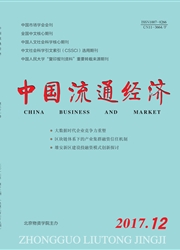

 中文摘要:
中文摘要:
大数据时代背景下智能供应链与全球供应链的出现,对物流服务的范围和水平提出了新的要求。与此同时,物流服务行业的低集中度和物流服务提供商的激烈竞争,使物流企业保留与扩展现有客户的业务比获取新的客户更有意义,物流企业应把更多资源用到培育与现有客户的关系上。本文利用双边调查数据,通过结构方程模型验证构念间逻辑关系,使用t检验判断双方企业对各变量的感知差异,旨在研究物流企业主动改进、双边关系绩效与客户忠诚度各维度间的关系。研究结果表明,物流企业主动改进成本和服务对客户忠诚度不同维度的影响不同;双方企业对物流企业主动改进的认知存在明显差异,对关系绩效的认知无显著不同。为提高物流企业客户忠诚度,深化企业双方合作,物流企业应当根据自身资源与战略有的放矢地选择合适的(成本-服务)组合;物流企业决策应以制造企业要求为基准,以定点超越的基准选择客户的要求,而不是习惯性地以竞争对手为参照;物流企业应加强与制造企业的沟通,缩小感知差异;物流企业应加强与制造企业的互动,提高关系紧密程度。而制造企业应加强与物流企业的沟通,缩小感知差异;加强与物流企业的互动,提高关系紧密程度。
 英文摘要:
英文摘要:
The article aims to study the complex relation between the various elements, which include elements for the logistics enterprise proactive improvement, dyadic relation performance and customer loyalty. It shows that logistics enterprises' cost and service of proactive improvement has different impacts on different dimensions of customer loyalty' the recognitions of logistics enterprises and their customers on proactive improvement are quite different, but their recognitions on relational performance are almost the same. To improve the customer loyalty and deepen the cooperation, logistics enterprises should, first, consider their own resources and strategies, choose the suitable combination of cost and service: second, they should make their decisions based on the requirements of manufacturing enterprises but not taking their rivals as the reference; third, they should strengthen the communication with manufacturing enterprises; and forth, they should strengthen the interaction with manufacturing enterprises. The manufacturing enterprises should also strengthen communication and interaction with logistics enterprises.
 同期刊论文项目
同期刊论文项目
 同项目期刊论文
同项目期刊论文
 期刊信息
期刊信息
